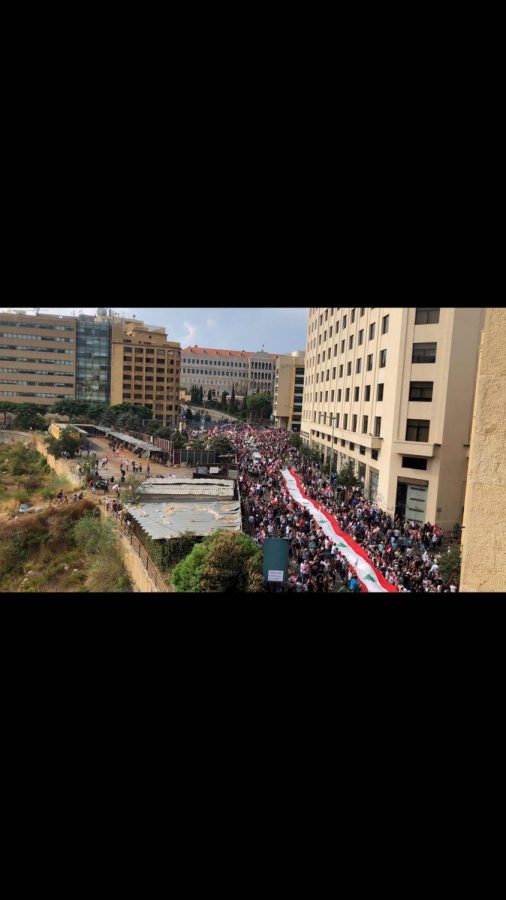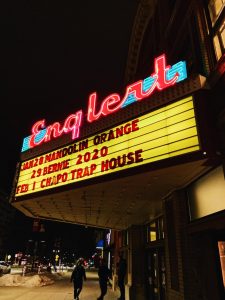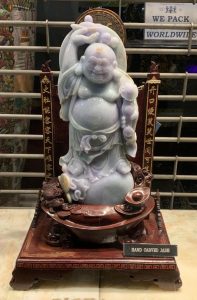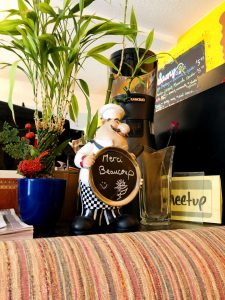Behind the Lebanese Protests
Since Oct. 17, the people of Lebanon have been protesting. What are their protests about?
Streets blocked by people, black smoke fills the air from burning tires. “Change them all!”,“All means all!” chanted the protesters in both Arabic and English. For the very first time, in the history of Lebanon, people unified under a Lebanese flag. This is Lebanon right now, ever since Oct. 17 the people of Lebanon have been protesting against the government.
While 62% of students polled said they were not aware of these protests, there are some people at West who are drastically impacted. These people follow the progresses and sacrifices that their family is making from Iowa City.
Kassem Abdallah, a student at the School of Dentistry in Beirut said, “People haven’t been going to work and school, the protesters are putting stress on the government by stopping income flow. Every protester had to sacrifice something from their daily lives to stop it. — Kassem Abdallah
The protests started over proposed taxes for using WhatsApp. WhatsApp is an app for texting that many citizens in Lebanon use. When the government placed the taxes, people were furious. But that is no longer what the protests are about. Instead the protests are a sign of national unity against the government’s corruption and its failure to provide for its citizens or fix the economic issues plaguing the country.
Fatima Kansoun, the owner of Beauty by Tima in Nabatieh said, “When people graduate from school, they don’t have jobs, and at the end of the month they don’t get enough money to pay all of these taxes. They don’t have opportunities in Lebanon so they look to travel.”
The Lebanese governmental system was created to try to balance the power between its three largest religions: Christianity, Sunni Islam, and Shia Islam. The president is Christianity, the Prime Minister is Sunni, and the Speaker of Parliament is Shia, and the rest of the government is divided by these religions. This system has been in place for 30 years, ever since the end of Lebanon’s Civil War. While this system has been credited as successful in preventing political unrest between the groups, many protesters blame it for the corruption they see in their government. All of the politicians in the government argue most of the time, and never support their citizens with basic human needs.
“The government places of power are disturbed by religion,” Abdallah said, “We live in a system that judges by religion rather than by their abilities. Most people in the government are the same people or children of past people in the government,”
Despite all past division between religions, the protests seem to be promoting national unity. Many protesters have been bringing the Lebanese flag to protests and playing the national anthem.
“We are scared to have a war between political groups. But, I still want to spread awareness by protesting.” said Kansoun, “We have to forget everything about our religion. The political parties are asking for one group, one Lebanon.”
In order to spread awareness of the protests, many Lebanese have taken to social media such as Instagram and Facebook. Recently, a video was posted to Facebook showing protesters singing “Baby Shark” by PinkFong to calm down a startled child, and there are many posts on Instagram of the protests. Despite all these posts, only 38% of students polled knew about the protests. The results of the poll showed that 76% of students think it is important to keep up with current events, but only 50% said that they were keeping up with the news. Many agreed that we should study current events in our specific social studies classes.
“While a specific culture is being studied, have students do current events on that culture to promote an understanding of other countries, and an interest in international news or just news in general,” said Zoe Vanatter ’20.
The Lebanese protesters want people to be aware of what is happening in their country. The more people who are aware of these issues, the more likely political reform is to happen.
“Around the world, Lebanese people are spreading awareness through social media, by sharing pictures,” Kansoun said. “Everyone should know everything.”.










